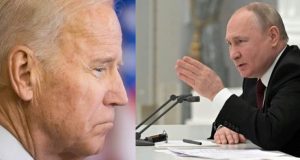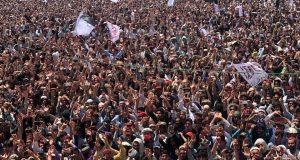The events taking place in Islamabad over the last few days leave no doubt about the aggravation of the crises in the state system of the country. The said crisis has reached a stage where it is too big to be swept under the carpet. Refusing ministers including the Minister Interior during a hearing of a case against Nawaz Sharif, former Prime Minister, and Ihsan Iqbal’s inability to hold responsible accountable- supposedly working under his ministry- is a reflection of government’s weakening grip on power. Who will know better than the Minister Interior about the existence of “a state within the state”?
The contraction of civilian control over state system is accompanied by the expansion of military’s power. There is no vacuum for sure! The total exclusion of representatives of political government from the delegation visiting Kabul and the press conference by DG ISPR on Thursday show as to who is shaping/executing foreign policy of the country. In this situation which country will take the visit of Foreign Minister of Pakistan seriously? The ruthless and reckless campaign against Intelligence Bureau, the prime civilian intelligence agency, and its DG by certain political parties and media quarters epitomizes depth of rift within the system. The much-maligned Parliament is effectively sidelined.
Nonetheless, the call, a sane one, of the Senate Chairman Mian Raza Rabbani for a grand national dialogue between the stack holders on the platform of Parliament was rejected or ignored by all and sundry. “Judicialization” of politics in the country has left the judiciary in tatters. Political leaders from both sides, government as well as opposition, have gone into survival mode. The political elite seems too incapacitated to launch an initiative for finding a way out of the crippling crises.
The ever-deepening divide between the civilian and military branches of state has paralyzed the system at a stage when it is in dire need to act and act wisely. The new US policy towards South Asia has drawn a red circle around Pakistan. Sensitive state institutions are publicly blamed for having connections with terrorist groups. As if this wasn’t enough, even closest international friends have called out Pakistan to act against violent extremist groups active in the country. Pakistan’s relation with three out of its four neighbors are frayed making substantial military deployment a necessity.
Furthermore, it is difficult to get a rational and objective analysis of the economic front as the government is making tall claims in bringing reforms and improvements in country’s economy. But the opposition is rubbishing such claims. Both sides have consensus on the fact that Pakistan will have to turn to IMF for a bailout shortly. In this situation, Pakistan can’t afford international isolation.
Despite all this, Pakistan can still put its house in order by starting the implementation of National Action Plan (NAP) and then confidently turn to meet global challenges. But unfortunately, the country seems to be moving in the reverse. The so-called political mainstreaming of the proscribed organizations is a case in point. De-radicalization projects the world over have specific rules and procedures. The militants renounce militant ideologies and strategies. First and foremost they are disarmed. But in the current case, the armed outfits even don’t pretend to be accepting any rules or procedures applied in the de-radicalization project. Some of them are preaching violence from their “political” platforms.
On the political front, one more challenge that the government needs to address on an emergency basis is the status of Federally Administered Tribal Areas (FATA). The government is yet to create a consensus among different stakeholders on the region’s status. Parliamentarians of the area have already staged a sit-in outside Parliament to register their protest against the delay in implementing FATA Reforms.
Also, there is zero effort to find a political solution to the bloody conflict in Balochistan. The problem is that the challenges mentioned above do not see a mention in the political discourse of the country. Years and years have been wasted in protests over the alleged rigging in elections of 2013 and making Nawaz Sharif ( him and him alone!) accountable due to the names of his children in the leaked Panama Papers. Instead of politically attacking the government on pressing policy issues the PTI led opposition groupings have been more focused on putschist strategies that have resulted in bitter and deep polarization.
The status quo is too toxic and explosive to be maintained indefinitely. Political leadership from both sides needs to rise to the occasion. Even now it isn’t too late to positively respond to the call given by the Senate Chairman for a national dialogue for putting the country back on track before the general elections to be held in the next year. Pakistan can take a fresh start with a consensus on a set of rules of the game. I remember the words of veteran Baloch leader Mir Ghous Bakhsh Bezjinjo, in 1977 in Hyderabad Jail. Mir Sahib had been a prominent football player at his young age and had also been a member of Ali Garh College’s football team in undivided India. He used to ask Zulfiqar Ali Bhutto to abide by rules of the game and not to twist the rules by using the state power. Mir Sahib warned ZAB that without rules there would be no game and he proved to be prophetic.
Writer: Afrasiab Khan Khattak
The writer is a regular contributor to THE PASHTUN TIMES. He is a retired senator and a leader of Awami National Party (ANP). He tweets @a_siab
 Pashtun Times Latest News
Pashtun Times Latest News




